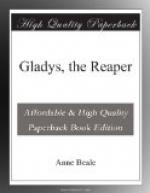Rowland Prothero is very much the reverse of all this. From a child he had a desire to enter the Church, which desire was fostered by his uncle and aunt into a resolution, when he grew old enough to resolve. As they very nearly adopted and educated him, his parents made no objection, and as they were ambitious to raise their family in worldly position, they spared no expense.
Rowland was reckoned dull, but plodding, at Rugby, whither his uncle sent him. However, his dulness and plodding were more successful than the brightness of many, since they managed to gain a scholarship at school, which helped him at Oxford. He was called proud and obstinate, and he was both. Pride and obstinacy were the characteristics of his family, but in him they fortunately tended to good: inasmuch as his pride generally led him to do well, and his obstinacy kept up his pride.
At present, it would be difficult to say whether he is a young man likely to shine in the path he has chosen, or to walk quietly along it unnoticed. His friends do not anticipate anything remarkable, but they expect him to be slow and sure. He did very well at college, but gained no greater honours than the respect and goodwill of those he was known to. Query—Is not that worth as much, morally, as a first class?
At home, he is understood by few. He has not many associates, because, either from his own fault, or some mental peculiarity, he cannot fall in with those who are immediately about him; and consequently is rather feared by his acquaintances and reckoned proud, stiff, and conceited—above his birth, in short.
With him, as with Howel and every one else, the course of years will show the man. ‘Handsome is that handsome does.’
‘The fact is, Rowland,’ said Howel, as he suddenly stood still in one of his rapid walks across the room, ’you and I never could agree in anything, and never shall.’
‘I hope we may yet agree in many things,’ said Rowland gently. ’At present, all I wish you to do is to pay your debts, go to London, take out your stamps, and become an attorney.’
’I am the best judge of that, and shall be my own master now. At all events, I can make some people ashamed of themselves.’
’I only wish to advise you for your good, now that you are your own master. Your poor father begged me—’
’Oh, Rowland, I can’t stand any more about my father. Everybody knows what he was, and, I suppose, nobody expects me to live in the same line. I am emancipated, thank heaven! and the world shall soon know it.’
‘Still, he was your father.’
’No one knows that better than I do, I should imagine; but if you expect me to mourn as others do for a parent, you will be disappointed. He never showed me one token of love, or acted by me as a father from the day of my birth till his death.’
’At least he has left you and your mother handsomely provided for, and with his last words, hoped that you were now very steady.’




